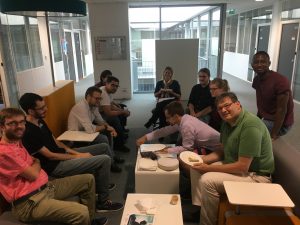Nouvelles
| Links' News |   |
| 2019 | |
|---|---|
Fri 18th Jan all day | Visit of Marie-Laure Mugnier and Federico Ulliana from Montpellier Inria 40 Avenue Halley, 59650 Villeneuve-d'Ascq, France |
| 2018 | |
Thu 20th Dec 5:00 pm 6:00 pm | STACS'19 paper by Florent Capelli accepted: "Tractable QBF via Knowledge Compilation" with Stefan Mengel |
Fri 16th Nov 11:00 am 12:30 pm | Aurelien Lemay's Habilitation defense IRCICA |
Mon 5th Nov 9:00 am 10:00 am | Bruno Guillon arrives: our new postdoc working on distributed databases |
Mon 15th Oct to Tue 16th Oct all day | Inria 40 Avenue Halley, 59650 Villeneuve d'Ascq, France |
Mon 17th Sep all day | |
Mon 3rd Sep 11:00 pm 12:00 am | Sławek Staworko's paper on SheX containment got accepted at PODS 2019! |
Tue 28th Aug to Fri 31st Aug all day | A major conference on logic in AI origanized in Lille. EuraTechnologies, Lille, France |
Mon 27th Aug all day | Rustam Azimov, a PhD student from Petersburg, starts his 3-months visit of Links. He will work with Sylvain Slavati and Joachim Niehren. |
Mon 16th Apr all day | ICALP'18 paper accepted by Charles Paperman Constrained Topological Sorting by Antoine Amarilli and Charles Paperman arxiv.org/pdf/1707.04310.pdf |
Thu 15th Mar all day | ShEx 2.0 Release of Java Implementation Publication of a first version of the implementation of ShEx 2.0 in java [ github.com/iovka/shex-java | github.com/iovka/shex-java ] |
Thu 1st Feb to Thu 8th Feb all day | Visit of Vincent Penelle, Université de Bordeaux |
Tue 16th Jan all day | Visit of Yann Strozecki, Université de Versailles |
Mon 8th Jan all day | Arrival of Jérémie Dusard Jérémie will work as an engineer on ShEx with Iovka Boneva |
Wed 3rd Jan 10:00 am 11:00 am | I. Boneva published a book published with the W3C on schemas validation for the semantic Web |
| 2017 | |
Tue 19th Dec 5:00 am 6:00 am | Annual report of Links 2017 is ready. |
Team presentation
The appearance of linked data on the web calls for novel database management technologies for linked data collections. The classical challenges from database research need to be now raised for linked data: how to define exact logical queries, how to manage dynamic updates, and how to automatize the search for appropriate queries. In contrast to mainstream linked open data, the LINKS project will focus on linked data collections in various formats, under the assumption that the data is correct in most dimensions. The challenges remain difficult due to incomplete data, uninformative or heterogeneous schemas, and the remaining data errors and ambiguities. We will develop algorithms for evaluating and optimizing logical queries on linked data collections, incremental algorithms that can monitor streams of linked data and manage dynamical updates of linked data collections, and symbolic learning algorithms that can infer appropriate queries for linked data collections from examples.
Research themes
We will develop algorithms for answering logical querying on heterogeneous linked data collections in hybrid formats, distributed programming languages for managing dynamic linked data collections and workflows based on queries and mappings, and symbolic machine learning algorithms that can link datasets by inferring appropriate queries and mappings. Our main objectives are structured as follows:
- Querying heterogeneous linked data. We will develop new kinds of schema mappings for semi- structured datasets in hybrid formats including graph databases, rdf collections, and relational databases. These induce recursive queries on linked data collections for which we will investigate evaluation algo- rithms, static analysis problems, and concrete applications.
- Managing dynamic linked data. In order to manage dynamic linked data collections and workflows, we will develop distributed data-centric programming languages with streams and parallelism, based on novel algorithms for incremental query answering, will study the propagation of updates of dynamic data through schema mappings, and will investigate static analysis methods for linked data workflows.
- Linking graphs. Finally, we will develop symbolic machine learning algorithms, for inferring queries and mappings between linked data collections in various graphs formats from annotated examples.
International and industrial relations
- Stream Processing: QuiXTools (with Innovimax)
- FUI Hermes



